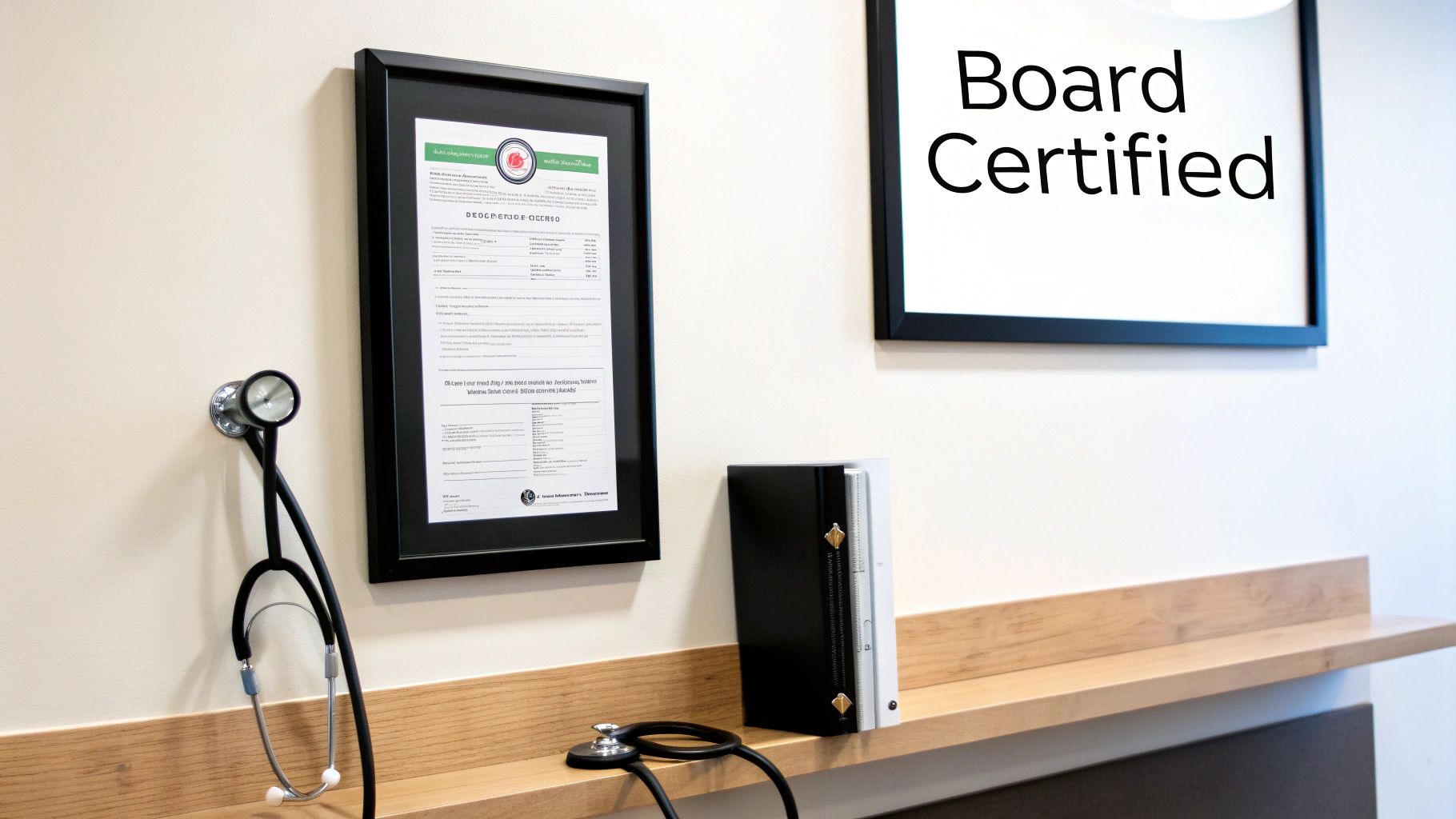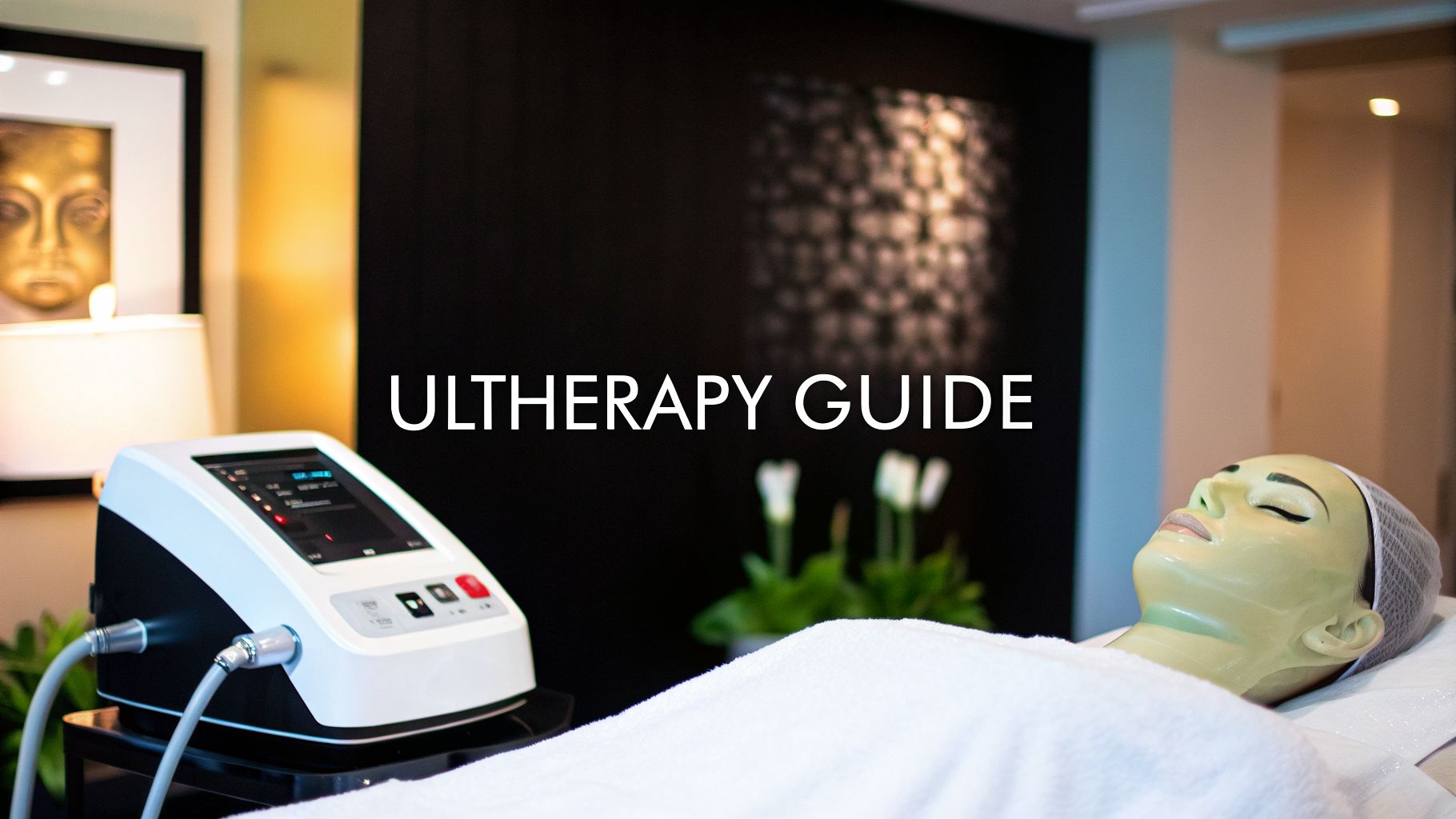
February 21, 2026
How to Prevent Keloid Scars After Surgery A Definitive Guide
Discover how to prevent keloid scars after surgery with our definitive guide. Learn expert strategies for risk assessment, surgery, and post-op scar care.
Nov 15, 2025

Choosing to undergo cosmetic surgery is a significant decision that demands thorough research and careful consideration. Your initial consultation is the most critical step in this journey, offering a direct line to understanding your surgeon's expertise, aesthetic philosophy, and commitment to your safety. However, walking into this meeting unprepared can leave you feeling overwhelmed rather than empowered. To ensure you make a confident and well-informed choice, it's crucial to have the right framework for the conversation.
This is where a prepared list of questions to ask cosmetic surgeon becomes an invaluable tool. It transforms the consultation from a passive experience into an active, investigative dialogue. We've compiled the ultimate checklist to guide you through this process, covering everything from credentials and experience to safety protocols and a surgeon’s approach to your unique aesthetic goals.
This comprehensive guide moves beyond the basics, providing you with the specific, actionable questions needed to fully evaluate a potential surgeon. Using this checklist will help you navigate the conversation with purpose, assess their suitability for your specific needs, and build a foundation of trust essential for a successful and satisfying outcome. Think of this as your roadmap to clarity, ensuring no critical detail is overlooked before you proceed.
This is arguably the most critical of all the questions to ask your cosmetic surgeon, as it forms the foundation of their qualifications. Board certification signifies that a surgeon has not only completed medical school and a residency but has also passed rigorous written and oral examinations, demonstrating a high level of knowledge and skill in their specialty. It's a key indicator of extensive training and a commitment to patient safety and ethical standards.

When you ask this question, you are verifying that the surgeon has met stringent criteria set by an accredited medical board. For plastic surgery of the face and body, the gold standard is certification by the American Board of Plastic Surgery (ABPS). For cosmetic surgery specifically, the American Board of Cosmetic Surgery (ABCS) is another recognized body. These certifications are not just one-time achievements; they require ongoing education to maintain, ensuring your surgeon is current with the latest techniques and safety protocols.
While board certification establishes a surgeon's foundational expertise, this question drills down into their specific experience with the procedure you are considering. A surgeon may be highly qualified in general plastic surgery but have less experience in a niche area like complex rhinoplasty or a specific type of facelift. High volume often correlates with higher proficiency, refined techniques, and a better ability to handle potential complications.
When you ask this question, you are gauging the surgeon's hands-on track record and level of specialization. An experienced surgeon should be able to provide a clear estimate of how many times they have performed your desired procedure, both in the last year and throughout their career. This specific data is a much stronger indicator of skill than general experience and is a crucial part of the "questions to ask your cosmetic surgeon" checklist. It helps ensure their expertise aligns perfectly with your surgical goals.
While credentials establish a surgeon's qualifications, visual evidence of their work demonstrates their artistic skill and technical ability. Reviewing a comprehensive gallery of before and after photos is one of the most effective ways to assess if a surgeon's aesthetic sense aligns with your desired outcome. This portfolio is a direct reflection of their experience and the consistency of their results, helping you set realistic expectations for your own procedure.

A robust collection of patient photos reveals the surgeon’s attention to detail, their ability to create natural-looking proportions, and their proficiency with specific procedures. When you ask this crucial question, you are moving beyond theoretical qualifications to see the tangible results of their craftsmanship. The importance of what to look for when viewing these images cannot be overstated; the guide on how to properly evaluate before and after photos for plastic surgery on ccplasticsurgery.com offers valuable insights into this process.
This is a fundamental question to ask your cosmetic surgeon because it shifts the conversation from desired outcomes to the realistic possibilities of surgery. Every surgical procedure, no matter how routine, carries inherent risks. An ethical and transparent surgeon will openly discuss both common and rare complications associated with your specific procedure, ensuring you can make a truly informed decision about your health and well-being.
When you ask about risks, you are not questioning the surgeon's ability but rather engaging in a crucial part of the consent process. The discussion should cover general risks like infection, bleeding, and adverse reactions to anesthesia, as well as procedure-specific issues such as scarring, asymmetry, nerve damage, or unsatisfactory aesthetic results. Understanding these potential issues allows you to weigh the benefits against the drawbacks and prepares you mentally for the recovery process.
Financial clarity is a critical component of a stress-free surgical journey. Asking for a complete cost breakdown is an essential question to ask your cosmetic surgeon because the initial quote may not cover all expenses. Transparency about pricing prevents unexpected bills and helps you budget accurately for your procedure, ensuring there are no surprises down the line. A reputable surgeon will provide a detailed, itemized quote that outlines every component of the total price.
The total cost typically includes the surgeon’s fee, anesthesia fees, and facility or operating room charges. However, there can be numerous other costs, such as pre-operative lab work, post-operative garments, prescription medications, and follow-up appointments. For a comprehensive financial picture, it is also important to delve into understanding insurance coverage and financing options, as most elective cosmetic procedures are not covered by insurance, but financing plans may be available.
Understanding the recovery process is just as important as understanding the procedure itself. This question sets realistic expectations and helps you plan your life around the healing period. A transparent surgeon will provide a detailed overview of what you can expect visually-from swelling and bruising to incision appearance-and a clear timeline for each stage of healing. This knowledge is crucial for arranging time off work, organizing help at home, and mentally preparing for the journey ahead.

This conversation should cover key milestones, such as when you can shower, drive, and resume normal daily activities. It also addresses when you can expect to see the initial results versus the final outcome, as it can take months for swelling to fully subside and tissues to settle. A thorough answer to this question demonstrates the surgeon's commitment to comprehensive patient care and ensures you are fully prepared for the post-operative experience.
This question transitions from the surgeon's qualifications to their artistic and technical philosophy. It is vital because a technically skilled surgeon may not have an aesthetic vision that aligns with yours. Understanding how they plan to translate your desired outcome into a surgical plan reveals their communication style, attention to detail, and whether they prioritize a collaborative or a prescriptive approach. This is where you determine if your surgeon is a partner in your aesthetic journey.
A great surgeon doesn’t just perform a procedure; they tailor it to your unique anatomy and goals. They should be able to articulate how they will balance your desires with what is surgically achievable and what will look harmonious with your overall features. Their answer will show if they value natural-looking enhancements, more dramatic transformations, or a spectrum in between, allowing you to find the right fit for your personal taste.
Informed consent is far more than just a signature on a form; it is a critical dialogue between you and your surgeon. This process ensures you fully comprehend the procedure, its potential benefits, inherent risks, and all available alternatives. A surgeon's approach to this conversation reveals their commitment to patient education, transparency, and ethical practice, making it one of the most vital questions to ask your cosmetic surgeon.
A thorough surgeon will dedicate significant time to this discussion, using clear, non-technical language to explain every aspect of the surgery. They should welcome your questions and ensure you feel completely comfortable before moving forward. This process should also involve a detailed discussion of realistic expectations, aligning your desired outcome with what is surgically achievable to prevent future disappointment.
The location where your surgery is performed is just as important as the surgeon performing it. This question helps you understand the environment's safety standards, emergency preparedness, and level of care. Cosmetic procedures can take place in a hospital, a freestanding ambulatory surgery center, or an office-based surgical suite. Each setting has different levels of oversight and equipment, directly impacting your safety and outcome.
An accredited facility has voluntarily undergone a rigorous evaluation to ensure it meets nationally recognized standards for patient safety. This includes having proper emergency equipment, qualified staff, and sterile operating conditions. Asking about these credentials is a crucial step in vetting your surgeon's practice and is a non-negotiable aspect of your due diligence. It ensures the facility is equipped to handle not just the procedure itself but any unforeseen complications that may arise.
A successful cosmetic procedure extends far beyond the operating room; it encompasses the entire recovery period. This question is crucial because it clarifies the surgeon’s commitment to your well-being after the surgery is complete. Exceptional post-operative care is a hallmark of a top-tier practice, ensuring you heal properly, achieve the best possible results, and have a clear plan if any issues arise.
When you ask your cosmetic surgeon about their follow-up protocol, you are assessing their dedication to patient outcomes. A structured follow-up schedule, clear emergency contact procedures, and a transparent policy for managing complications are non-negotiable. This conversation helps you understand how accessible your surgeon will be during a potentially vulnerable time, providing peace of mind that you will be supported throughout your healing journey.
Navigating the world of cosmetic surgery can feel overwhelming, but being prepared makes all the difference. By now, you are armed with a comprehensive checklist of critical questions to ask your cosmetic surgeon, moving you from a place of uncertainty to one of empowered decision-making. This isn't just about ticking boxes; it's about initiating a meaningful dialogue that builds the foundation for a successful and safe surgical journey.
The answers you've received to these questions paint a complete picture. You now understand the immense importance of board certification, the value of a surgeon's specific experience with your desired procedure, and the necessity of reviewing a portfolio of real patient results. You have the tools to dissect cost breakdowns, visualize a realistic recovery timeline, and ensure the surgical facility meets the highest safety standards. This knowledge is your most powerful asset.
Remember, the goal is to find more than just a skilled technician; you are seeking a trusted partner in your aesthetic journey. The most critical takeaways from this guide can be distilled into three core principles:
This process is a profound investment in yourself, and choosing the right surgeon is the single most important decision you will make. Take the time to review the notes from your consultations. Compare the responses you received. Did one surgeon's approach to your aesthetic goals resonate more deeply? Did you feel a stronger sense of partnership and trust in one particular office?
Ultimately, the right choice will align technical excellence with a strong, communicative patient-surgeon relationship. This combination is the key to not only achieving beautiful, natural-looking results but also ensuring a positive, supportive experience from your first inquiry to your final follow-up appointment. You have done the research, and now you can move forward with the confidence you deserve.
Ready to start the conversation with a team that values patient education and personalized care? At Cape Cod Plastic Surgery, Dr. Marc Fater is dedicated to answering every one of your questions in our fully-accredited, on-site surgical suite. Schedule your personalized consultation today to take the next confident step in your aesthetic journey. Cape Cod Plastic Surgery

February 21, 2026
Discover how to prevent keloid scars after surgery with our definitive guide. Learn expert strategies for risk assessment, surgery, and post-op scar care.

February 20, 2026
What is Ultherapy treatment? Explore this non-surgical facelift, how it uses ultrasound to lift skin, and what results you can expect from the procedure.

February 19, 2026
Explore stunning cheek filler before and after results. See real patient photos, learn about filler types, and discover what's possible for your facial contour.